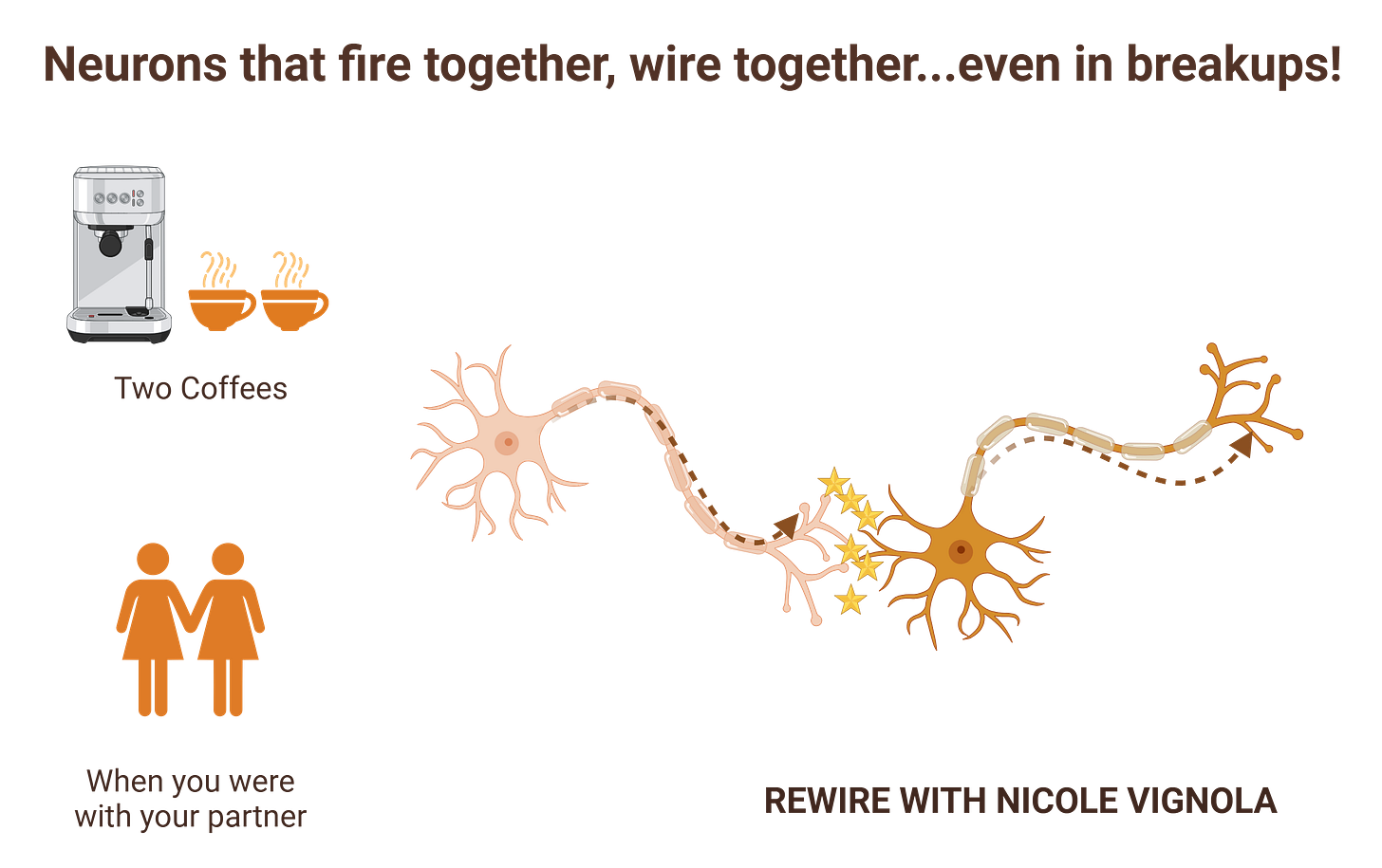Hey Rewire Collective,
Welcome to this weeks newsletter! Let’s talk about the neurobiology behind breakups – why they cause pain and how to get through them.
Breakups are the most popular topic on my channel and I get weekly messages asking about how to navigate them.
Neuroplasticity and Break-Ups
Break-up pain is real – we know that the same brain areas activated during physical pain are also activated when experiencing break-up pain1.
Why are they so painful? A lot of reasons really. For one, social rejection is never pleasant. But, to add to that, our brain pathways integrate with our partners. They become part of our daily routine – texting them, calling them, seeing them, cooking with them, eating with them, sleeping with them. Neurons that fire together, wire together2. So, if your neurons for your partner fire when your neurons for cooking fire, those two things are now associated. It is difficult to break these associations, especially when breakups are typically abrupt. We lose the person but also the routines, habits, and behaviours. You’ll probably find yourself instinctively making two cups of coffee, or going to text them when you’re on your way home from work, for some time after.

To add to that complexity, we know that our hearts have neuronal maps, and that the heart can remember its previous firing patterns3. This is particularly seen in the context of heart disorders, but studies from heart transplants suggest it may store more than just firing patterns. In a small subset of people given heart transplants, personality changes that match the person whose heart they now have have been observed4,5. It is possible that the heart remembers how it fired in response to particular stimuli (people, places, things), and that translates to behavioural change. In that case, losing a person you care about and no longer receiving stimuli for them would impact the heart.
The Feeling of Rejection
How can we help the feeling of rejection?
There’s a few ways, and they’ll also help with rumination, establishing new brain connections, and general feelings of well-being.
Engaging in dopamine-boosting activities like: exercise, hobbies, and socialising!
Engaging in mindful activities like: suduko, chess, or anything requiring your focus and attention!
Engaging in serotonin-boosting activities: laughter, sunlight!
How to Rewire Without Them
Now that the person is no longer part of your daily life, or at least not in the same way, it can be helpful to kick-start rewiring.
Get enough sleep – sleep is our biggest tool for memory consolidation, aka storing new routines and memories. We need sleep to help us make new brain connections.
Hydrate – our brain is 70% water, if you want it to function optimally, drink some water!
Start a new hobby – learning something new helps the production of brain-derived neurotrophic factor (BDNF), which promotes neuronal growth! It will also trigger new brain connections, and memory formation, and encourage socialisation!6
Exercise – also responsible for the production of BDNF!7
Verbalise your thoughts and emotions – this allows your prefrontal cortex, the rational guy, to take over. It will help with any rumination and boost emotional processing.8
Meditation – this will help reduce your amygdala, which is the emotion and fear-based centre which is typically hyperactive during break-ups.9
Try aromatherapy – it can help reduce cortisol – stress hormone – levels, and increase BDNF production.10
How to Help: Rumination and Doomscrolling
Firstly, identifying when you’re most prone to doing this is helpful. Typically, in the morning and at night are popular times to go on our phones (which is bad for you anyway!) which invites the rumination and scrolling to begin.
So:
Avoid phones first thing in the morning and before going to bed.
Replace the scrolling behaviour with a different dopamine-triggering activity, like exercise, a hobby, a coffee, playing with your pet, or seeing a friend!
Replace the scrolling behaviour with a social connection – try calling a friend or family member!
Change your surroundings! Get out and go for a walk.
Practise visualising how you overcome the temptation to scroll, so it becomes easier to do so when you get the urge!
If you’re ruminating, trying writing down what you’re feeling, or say it out loud! This will help activate the logical side of your brain. Double whammy – call a friend to say it out loud to them, serotonin + stop rumination!
Serotonin on the Rise
It is natural for serotonin levels to drop during a break up. This will contribute to your feelings of sadness. So, we can try a few different ways to naturally boost serotonin during this time.
Engage in social connections.11
Engage in aerobic activity.12
Get sunlight! It boosts your serotonin.13
Laugh! It reduces stress and anxiety.14
Make it a priority to incorporate these things into your day. You need them, and you deserve them.
Breakup chapter in Rewire
And don’t forget that I have a whole chapter on breakups in Rewire!
You can buy your copy below!
Until Next Week,
Nicole x
P.S. Leave a comment with any topics you want covered in future newsletters!
References




A bit of a deeper dive into the speaking out loud option? 💚